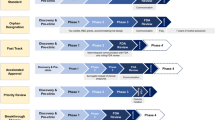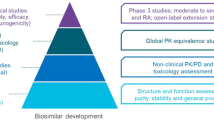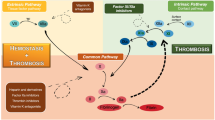Abstract
Objective
The aim of this article is to conduct a literature review on first-generation TRK inhibitors (TRKi), namely entrectinib and larotrectinib, to describe the most common adverse events (AEs) and their management in adults.
Methods
A search strategy was conducted in MEDLINE, EMBASE, and Google Scholar using a list of predetermined keywords. Peer-reviewed articles written in English and published through June 2021 were included. Articles covered included randomized clinical trials and expert recommendations, as well as patent and other types of reviews.
Results
The discussed AEs include weight gain and withdrawal pain, as well as neuromuscular, central nervous system (dysesthesias and peripheral sensory neuropathies, dizziness and ataxia, and dysgeusia), gastrointestinal (nausea, vomiting, and diarrhea), and respiratory symptoms. Additionally, several AEs encountered with entrectinib specifically (cognitive and vision disorders, congestive heart failure, QTc elongation, and skeletal fractures) are discussed. First, an overall mechanism of action explaining these AEs is presented. Then, for each AE, incidence and severity are stated and followed by practical management recommendations. While nearly all AEs were reversible upon TRKi suspension, the proposed managements are mainly constituted of pharmacological and non-pharmacological interventions.
Conclusion
With the estimated growth of gene sequencing in the coming years, it is foreseeable that TRKi will take a larger position in the oncologic therapeutic arsenal. Therefore, adequate management of AEs associated with TRKi in adults should be a prime focus.
Similar content being viewed by others
Data availability
Not applicable.
Code availability
Not applicable.
References
Cocco E, Scaltriti M, Drilon A et al (2018) NTRK fusion-positive cancers and TRK inhibitor therapy. Nat Rev Clin Oncol 15:731–747
Demetri GD, Antonescu CR, Bjerkehagen B et al (2020) Diagnosis and management of tropomyosin receptor kinase (TRK) fusion sarcomas: expert recommendations from the World Sarcoma Network. Ann Oncol 11:1506–1517
Bailey JJ, Jaworski C, Tung D et al (2020) Tropomyosin receptor kinase inhibitors: an updated patent review for 2016–2019. Expert Opin Ther Pat 5:325–339
Kummar S, Lassen UN (2018) TRK inhibition: a new tumor-agnostic treatment strategy. Target Oncol 13:545–556
Lassen U (2019) How I treat NTRK gene fusion-positive cancers. ESMO Open 4(Suppl 2):1–3
Perreault S, Chami R, Deyell RJ et al (2021) Canadian consensus for biomarker testing and treatment of TRK fusion cancer in pediatric patients. Curr Oncol 28:346–366
Bebb DG, Banerji S, Blais N et al (2021) Canadian Consensus for Biomarker Testing and Treatment of TRK Fusion Cancer in Adults. Curr Oncol 28:523–548
Liu D, Flory J, Lin A et al (2020) Characterization of on-target adverse events caused by TRK inhibitor therapy. Ann Oncol 9:1207–1215
Lim JSJ, Tan DSP (2020) TRK inhibitors-managing on-target toxicities. Ann Oncol 20:39897–39905
OnTarget. Available at https://ontargetonco.com/. Accessed May 13, 2021
Doebele RC, Drilon A, Paz-Ares L et al (2020) Entrectinib in patients with advanced or metastatic NTRK fusion-positive solid tumours: integrated analysis of three phase 1–2 trials. Lancet Oncol 21:271–282
Drilon A, Laetsch TW, Kummar S et al (2018) Efficacy of larotrectinib in TRK fusion-positive cancers in adults and children. N Engl J Med 378:731–739
National Cancer Institute. Common Terminology Criteria for Adverse Events (CTCAE) Version 4.0. Available at https://evs.nci.nih.gov/ftp1/CTCAE/CTCAE_4.03/Archive/CTCAE_4.0_2009-05-29_QuickReference_8.5x11.pdf. Accessed May 13, 2021
Drilon A (2019) TRK inhibitors in TRK fusion-positive cancers. Ann Oncol 20(suppl 8):23–30
Hovan AJ, Williams PM, Stevenson-Moore P et al (2010) A systematic review of dysgeusia induced by cancer therapies. Support Care Cancer 18:1081–1087
Hoffman-La Roche Limited. Product monograph including patient medication information: Rozlytrek. Available at https://www.rochecanada.com/content/dam/rochexx/roche-ca/products/ConsumerInformation/MonographsandPublicAdvisories/Rozlytrek/Rozlytrek_PM_E.pdf. Accessed May 13, 2021
U.S. Food and Drug Administration. Prescribing information: Rozlytrek. Available at https://www.accessdata.fda.gov/drugsatfda_docs/label/2019/212725s000lbl.pdf. Accessed May 13, 2021
Bayer Inc. Product monograph including patient medication information: Vitrakvi. Available at https://omr.bayer.ca/omr/online/vitrakvi-pm-en.pdf. Accessed May 13, 2021
U.S. Food and Drug Administration. Prescribing information: Vitrakvi. Available at https://www.accessdata.fda.gov/drugsatfda_docs/label/2018/211710s000lbl.pdf. Accessed May 13, 2021
Loprinzi CL, Lacchetti C, Bleeker J et al (2020) Prevention and management of chemotherapy-induced peripheral neuropathy in survivors of adult cancers: ASCO guideline update. J Clin Oncol 38:3325–3345
Timmins HC, Mizrahi D, Li T et al (2021) Metabolic and lifestyle risk factors for chemotherapy-induced peripheral neuropathy in taxane and platinum-treated patients: a systematic review. J Cancer Surviv. Abstract s11764–021–00988-x
Fife K, Herd R, Lalondrelle S et al (2017) Managing adverse events associated with vismodegib in the treatment of basal cell carcinoma. Future Oncol 13:175–184
Moore KN, Monk BJ (2016) Patient counseling and management of symptoms during olaparib therapy for recurrent ovarian cancer. Oncologist 21:954–963
Paz-Ares L, Barlesi F, Siena S et al (2021) Patient-reported outcomes from STARTRK-2: a global phase II basket study of entrectinib for ROS1 fusion-positive non-small-cell lung cancer and NTRK fusion-positive solid tumours. ESMO Open 6:100–113
Hesketh PJ, Kris MG, Basch E, et al (2020) Antiemetics: ASCO Guideline Update. J Clin Oncol 38(24):2782–2797. https://doi.org/10.1200/JCO.20.01296
U.S. Food and Drug Administration. Prescribing information: Akynzeo. Available at https://www.accessdata.fda.gov/drugsatfda_docs/label/2018/210493s000lbl.pdf. Accessed May 28, 2021
Bossi P, Antonuzzo A, Cherny NI et al (2018) Diarrhoea in adult cancer patients: ESMO Clinical Practice Guidelines. Ann Oncol 29(Suppl 4):126–142
Yancy CW, Jessup M, Bozkurt B et al (2017) 2017 ACC/AHA/HFSA focused update of the 2013 ACCF/AHA guideline for the management of heart failure: a report of the American College of Cardiology/American Heart Association Task Force on clinical practice guidelines and the Heart Failure Society of America. Circulation 136:137–161
European Society for Medical Oncology. ESMO Clinical Practice Guidelines: supportive and palliative care. Available at https://www.esmo.org/guidelines/supportive-and-palliative-care. Accessed June 11, 2021
Harvard T.H. Chan School of Public Health. Obesity prevention source. Available at https://www.hsph.harvard.edu/obesity-prevention-source/obesity-causes/diet-and-weight/. Accessed June 11, 2021
Powell-Wiley TM, Poirier P, Burke LE et al (2021) Obesity and cardiovascular disease: a scientific statement from the American Heart Association. Circulation 143:984–1010
American Society of Clinical Oncology (ASCO). Joint pain. Available at https://www.cancer.net/coping-with-cancer/physical-emotional-and-social-effects-cancer/managing-physical-side-effects/joint-pain. Accessed June 8, 2021
BreastCancer.org. Muscle Pain (Myalgia). Available at https://www.breastcancer.org/treatment/side_effects/muscle_pain. Accessed June 8, 2021
ESMO (2018) Diarrhoea in adult cancer patients: ESMO Clinical Practice Guidelines. Ann Oncol 29 (Suppl 4): 126–142.
BC Cancer Agency. Symptom management guidelines: pain. Available at http://www.bccancer.bc.ca/nursing-site/Documents/13.%20Pain.pdf. Accessed June 4, 2021
Jordan B, Margulies A, Cardoso F et al (2020) Systemic anticancer therapy-induced peripheral and central neurotoxicity: ESMO-EONS-EANO Clinical Practice Guidelines for diagnosis, prevention, treatment and follow-up. Ann Oncol 31:1306–1319
Sartore-Bianchi A, Pizzutilo EG, Marrapese G et al (2020) Entrectinib for the treatment of metastatic NSCLC: safety and efficacy. Expert Rev Anticancer Ther 20:333–341
BC Cancer. Problems with balance and coordination. Available at http://www.bccancer.bc.ca/managing-symptoms-site/Documents/Balance-and-Coordination.pdf. Accessed May 19, 2021
Federman N, McDermott R (2019) Larotrectinib, a highly selective tropomyosin receptor kinase (TRK) inhibitor for the treatment of TRK fusion cancer. Expert Rev Clin Pharmacol 12:931–939
Lacouture ME, Dréno B, Ascierto PA et al (2016) Characterization and management of hedgehog pathway inhibitor-related adverse events in patients with advanced basal cell carcinoma. Oncologist 21:1218–1229
BC Cancer Agency. Nutritional guidelines for symptom management: taste changes. Available at http://www.bccancer.bc.ca/nutrition-site/Documents/Symptom%20management%20guidelines/TasteChanges.pdf. Accessed May 26, 2021
Scott LJ (2019) Larotrectinib: first global approval. Drugs 79:201–206
National Comprehensive Cancer Network. NCCN guidelines – supportive care. Available at nccn.org/guidelines/category_3. Accessed June 11, 2021
U.S. Food and Drug Administration. Prescribing information: Varubi. Available at https://www.accessdata.fda.gov/drugsatfda_docs/label/2015/206500s000lbl.pdf. Accessed May 28, 2021
Andreyev J, Ross P, Donnellan C et al (2014) Guidance on the management of diarrhoea during cancer chemotherapy. Lancet Oncol 15:447–460
Stein A, Voigt W, Jordan K (2010) Chemotherapy-induced diarrhea: pathophysiology, frequency and guideline-based management. Ther Adv Med Oncol 2:51–63
Hong DS, Bauer TM, Lee JJ et al (2019) Larotrectinib in adult patients with solid tumours: a multi-centre, open-label, phase I dose-escalation study. Ann Oncol 30:325–331
Hong DS, DuBois SG, Kummar S et al (2020) Larotrectinib in patients with TRK fusion-positive solid tumours: a pooled analysis of three phase ½ clinical trials. Lancet Oncol 21:531–540
Author information
Authors and Affiliations
Contributions
CM, MKT, NO, FP, and LT wrote the manuscript. MPG, NL, and JPA reviewed the manuscript.
Corresponding author
Ethics declarations
Ethics approval
Not applicable.
Consent to participate
Not applicable.
Consent for publication
Not applicable.
Conflict of interest
The authors declare no competing interests.
Additional information
Publisher's note
Springer Nature remains neutral with regard to jurisdictional claims in published maps and institutional affiliations.
Rights and permissions
Springer Nature or its licensor (e.g. a society or other partner) holds exclusive rights to this article under a publishing agreement with the author(s) or other rightsholder(s); author self-archiving of the accepted manuscript version of this article is solely governed by the terms of such publishing agreement and applicable law.
About this article
Cite this article
Martineau, C., Turcotte, MK., Otis, N. et al. Management of adverse events related to first-generation tyrosine receptor kinase inhibitors in adults: a narrative review. Support Care Cancer 30, 10471–10482 (2022). https://doi.org/10.1007/s00520-022-07401-y
Received:
Accepted:
Published:
Issue Date:
DOI: https://doi.org/10.1007/s00520-022-07401-y




